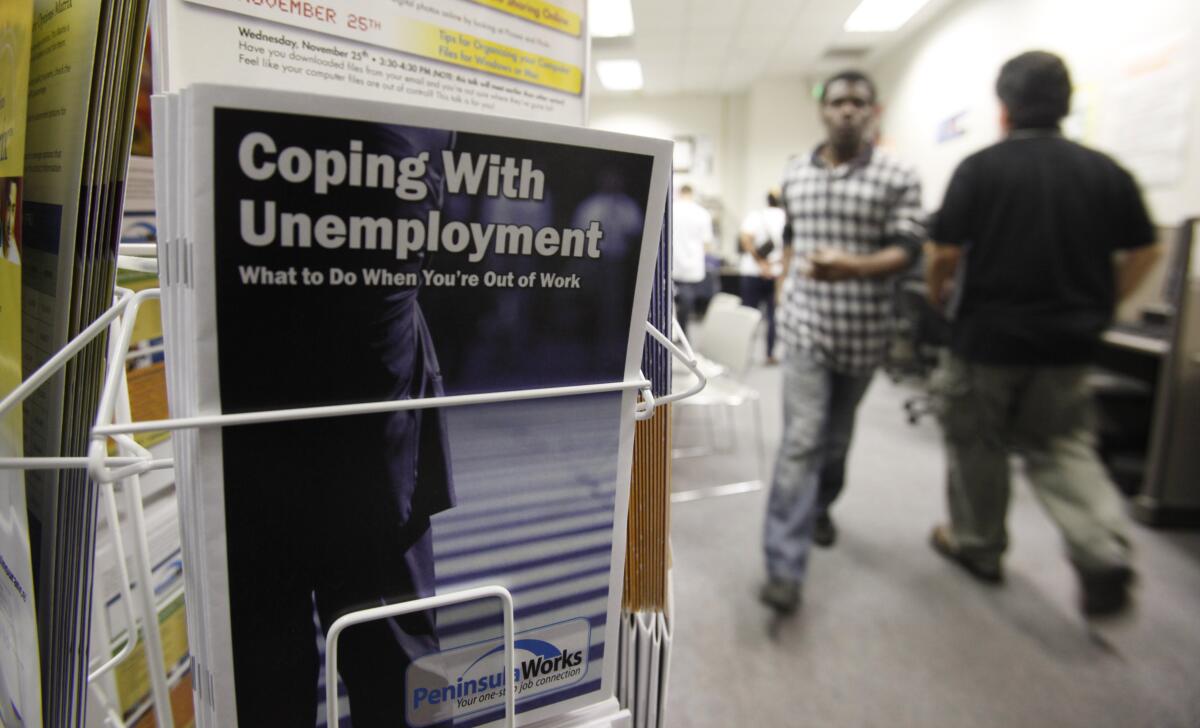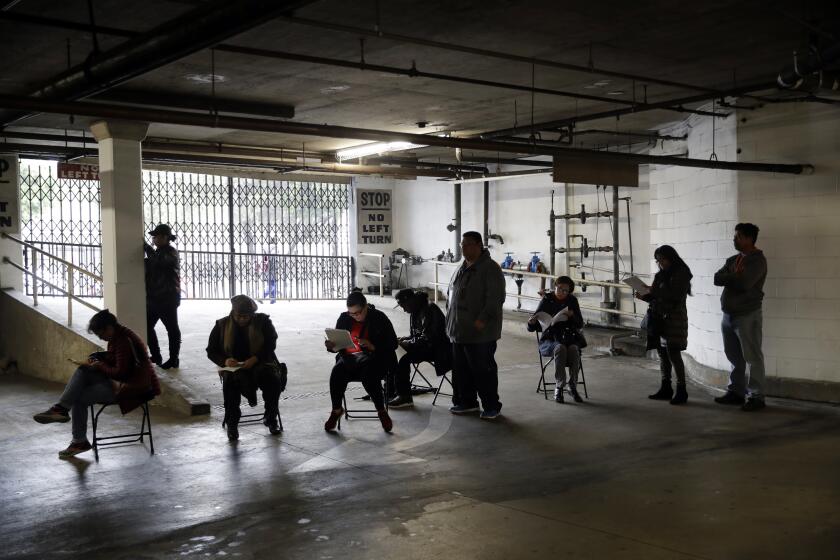California dropped its guard before it was hit with $2 billion in unemployment fraud

- Share via
SACRAMENTO — As California grapples with staggering levels of unemployment benefit fraud — $2 billion or more by one estimate — lawmakers and security experts say the state let its guard down well before the COVID-19 pandemic began in March, failing to keep up with what other states have done to flag bogus claims.
Now, faced with what officials describe as the largest fraud scheme against taxpayers in state history, the state Employment Development Department is scrambling to fix past mistakes as prosecutors, government auditors and legislators say their early warnings about vulnerabilities in the unemployment benefit system went unheeded.
Many of the phony claims were preventable, they say, if California had taken precautions implemented in other states, including using sophisticated software to identify suspect applications, keeping Social Security numbers out of official mail and cross-checking benefit claims against personal data on state prison inmates. Cross-checking is routine in 35 other states.
Adding to the problems, there have been delays in trying to address long-standing issues at the agency that have undercut attempts to safeguard against fraud. State prison officials had maintained that they could not legally share prisoners’ Social Security information with the EDD, an assertion that was knocked down this month by a legal opinion from the state Department of Justice.
The controversy hindered the ability of investigators outside the prison system to discover rampant fraud, some officials said.
“Months of dithering have cost California taxpayers hundreds of millions of dollars,” said Assemblywoman Cottie Petrie-Norris (D-Laguna Beach), chairwoman of the Assembly Committee on Accountability and Administrative Review.
The bank, which has contracted with the state Employment Development Department to issue debit cards containing unemployment benefits, issued the warning in a letter to California legislators.
The EDD also has not acted swiftly enough on warnings from March 2019 that it was exposing claimants’ Social Security numbers to fraud by sending them in the mail, according to the state auditor, who said Washington and Texas are among states that do not include full numbers in mail.
In addition, legislators are questioning why the EDD canceled a contract five years ago with a firm that was using sophisticated software to help ferret out bogus claims. The firm is being used in dozens of federal and state agencies, including in Nevada and Wisconsin.
“On the face of it, the cancellation of a fraud detection system seems shortsighted,” Petrie-Norris said.
As fraud totals continue to balloon — one prosecutor says there is unverified evidence it may total $4 billion — the state is playing catch-up to right past wrongs in the unemployment system. Bolstered by the new legal opinion, it has finally begun cross-checking prison inmate data with unemployment claims, and it has rehired the antifraud contractor.
In addition, lawmakers have introduced several bills this month to fight fraud, including a measure by Petrie-Norris that would require EDD to cross-check prisoners’ data with unemployment claims.
California has paid out more than $110 billion on jobless claims since the state began restricting business operations and urging residents to stay home to reduce the spread of the coronavirus. The volume of claims has overwhelmed the EDD, which still has a backlog of 683,000 claims that have not been approved, while it has made payments on many fraudulent claims.
“EDD was woefully unprepared for the unparalleled demands created by COVID-19,” state Labor Secretary Julie A. Su said last week.
Bank of America, which has a contract with EDD to issue debit cards containing benefits, recently warned that fraud in California’s unemployment benefits system could total $2 billion.
Some district attorneys and investigators say that top California leaders are not doing enough to stop unemployment fraud, even after abuses of EDD jobless benefits were exposed.
The bank said it has identified 640,000 accounts as being associated with suspicious activity, including claims filed in the names of infants, children, centenarians and people living in other states.
Separately, a task force of district attorneys said EDD paid $400 million on some 21,000 claims in the names of prison inmates, including Scott Peterson, who was convicted of murdering his wife.
The widespread fraud is not a surprise to Haywood Talcove, chief executive of the Government group at LexisNexis Risk Solutions, which warned states and federal agencies that trouble was brewing before it sent out $2 trillion in economic relief that was part of the CARES Act approved by Congress in March.
“We warned them that this was going to be like taking candy from a baby, that this was going to be Christmas for the fraudsters if they didn’t do some basic identity screening,” Talcove said.
Lawmakers are particularly alarmed by a decision five years ago to end a contract with a fraud-detection firm after a one-year $1.75-million grant from the U.S. Department of Labor expired.
Pondera Solutions, a Sacramento-area firm, used Google technology and publicly available data to flag claims that might be fraudulent. The firm was “very successful” at identifying problem claims, said Patrick W. Henning Jr., who was director of the EDD from 2014 through the end of last year and an appointee of former Gov. Jerry Brown.
“The federal grant ran out and at the time the fraud rate was nowhere near what we’re seeing today,” Henning said. “We asked the [federal officials] if they would re-up it and they said no.”
With no federal funds available, EDD did explore other ways to fund the contract “but it was determined at the time that it was not needed given the decrease in claims” as the economy improved, said Loree Levy, a spokeswoman for the EDD.
Federal authorities Thursday unveiled charges in three separate conspiracies to defraud California’s unemployment benefits, including one that used the name of U.S. Sen. Dianne Feinstein.
El Dorado County Dist. Atty. Vern Pierson, who is part of the task force investigating the prison fraud, said he told EDD officials five years ago that he would like to get information that the contractor gathered that could help identify people who were incarcerated and claiming benefits, but the contract ended before he could obtain any data. Pierson also questioned the state’s decision not to continue funding the Pondera contract back then.
“It appears as though they chose to save a few million dollars while risking losing hundreds of millions of dollars,” said Pierson, who is president of the California District Attorneys Assn. “A large percentage of the fraud would have been prevented.”
Levy said Thursday that the agency has signed a new contract with Thomson Reuters, the firm that bought Pondera, and resumed using its software on Oct. 1.
The service, she said, provides “access to unique data not available within civil service.”
Also in October, the EDD started using another new contractor, ID.me, that verifies the identity of claimants before benefits are sent out.
The EDD had been following federal guidance to allow many claimants to self-certify so benefits could be sent out faster, officials said.
The contractor estimates up to 30% of attempts to use the ID.me system since early October in California are possible scammers who were blocked from filing a claim.
The massive fraud has also forced a change in the state prison agency’s practice of not sharing the Social Security numbers of inmates with the EDD.
The new total is nearly three times the $140 million in claim payments estimated last week by a group of California DAs and a federal prosecutor.
The task force of nine district attorneys complained last month that the ability to identify prison fraud had been hampered by the California Department of Corrections and Rehabilitation’s refusal to share personal data of prisoners with EDD.
The prison agency said state law only allowed it to share data on inmates with law enforcement agencies and it said EDD did not qualify.
As a result, the U.S. attorney’s office had to file a subpoena on behalf of the U.S. Department of Labor to compel the state prison agency to provide information on inmates, but only for the investigation.
The state Department of Justice has in the last few weeks issued a legal opinion rejecting the CDCR’s interpretation of the law.
“EDD investigators are peace officers authorized under Penal Code section 11105 to receive criminal offender record information in the course and scope of an investigation related to violations of the Unemployment Insurance Code,” the Department of Justice said in a statement to The Times last week.
Another crack in the system was identified in March 2019, a year before the pandemic began, when State Auditor Elaine Howle issued a report warning that the EDD was risking fraud by sending mail containing Social Security numbers to claimants.
The EDD has failed to follow through on a recommendation to stop the practice, which Howle has called dangerous.
Since the pandemic began, the EDD has mailed out 38 million pieces of mail containing claimants’ Social Security numbers and “has continued to place Californians at risk of identity theft,” Howle said in a letter to the governor last month.
That inaction by EDD was costly, said Assemblyman Jim Patterson (R-Fresno), vice-chair of the administrative review panel, who believes it contributed to the fraud problem.
“They have been reckless and careless with the personal information of millions of Californians,” he said.
EDD officials said they have removed Social Security numbers from some documents mailed out, but need more time to change other department documents to end the practice.
Meanwhile, observers say the $2-billion estimate of fraud may end up being low when the dust settles. Pierson said the district attorneys task force has seen unverified information indicating it could be closer to $4 billion.
If past years’ fraud rates are applied to claims paid this year, the level of fraud could be $2.8 billion “but likely higher,” according to a report by the California Center for Jobs and the Economy.
“We won’t know until EDD catches up and can do some real audits — a time that is likely more than six months and perhaps as much as a year away,” said Michael A. Shires, associate professor of public policy at Pepperdine University. “At that time, don’t be surprised if the number dwarfs even these estimates.”
More to Read
Sign up for Essential California
The most important California stories and recommendations in your inbox every morning.
You may occasionally receive promotional content from the Los Angeles Times.













